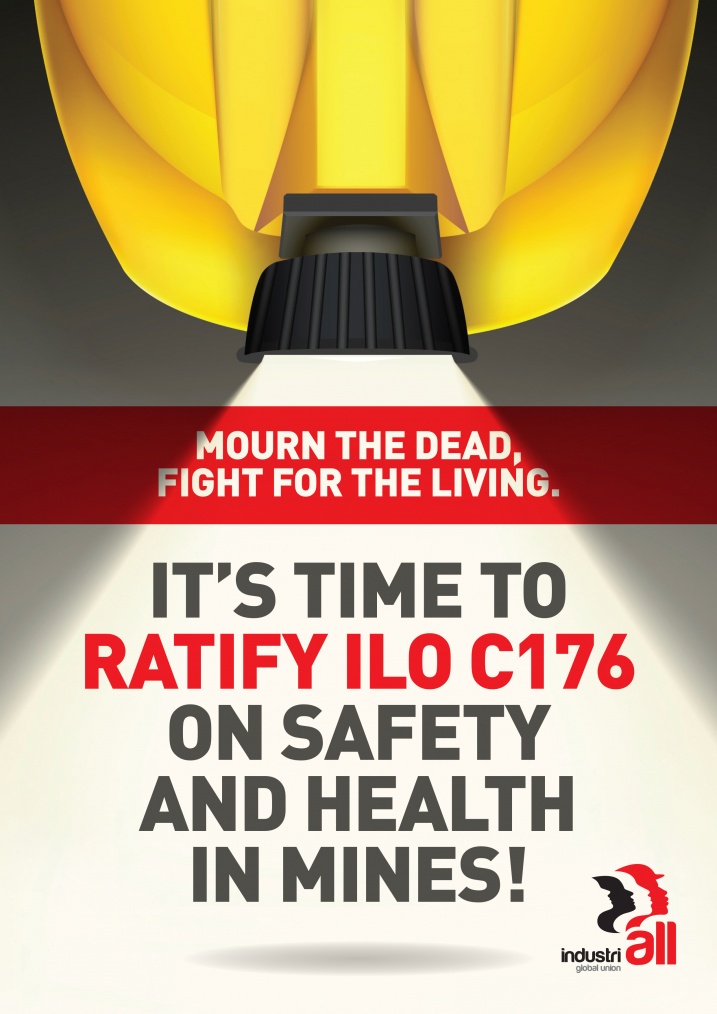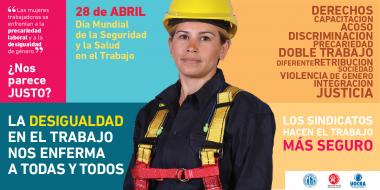IndustriALL Global Union has written a letter of solidarity to the President of Iran urging the government to improve safety in Iranian mines after at least 35 miners were killed and scores injured in a coal mine explosion on 3 May. more

IndustriALL Global Union has written a letter of solidarity to the President of Iran urging the government to improve safety in Iranian mines after at least 35 miners were killed and scores injured in a coal mine explosion on 3 May. more





There is still time to visit the exhibition of relevant material compiled from the Leeds Library and Information Service Local and Family History collection on the first floor of Leeds Central Library. This will run until Friday 5th May so do have a look if you are in Leeds this week as it is very interesting and informative.
A l’occasion de la Journée mondiale de la sécurité et de la santé au travail célébrée la semaine dernière, la Coordination Nationale de l’ITF (Fédération Internationale des ouvriers du Transport) et la Fédération des Syndicats des Travailleurs des Transports du Togo (FESYTRAT) ont conjointement organisé deux rencontres.
(Jakarta, 28 April 2017). Asbestos has been used in Indonesia since 1950. To date, Indonesia ranks 5th of the big asbestos consumer countries in the world with total consumption until 2015 reaches 119,405 ton and the 3rd largest country that imports asbestos with total import from 2007 to 2015 reachs 1.043.882 ton. Statistic Indonesia recorded that about 6.06 million households in Indonesia (9.25%) use asbestos roofing.
Asbestos is a commercial name for asbestos mineral fibres which are commonly used as roofing, brake pad, gasket, insulator and many other products. WHO estimates about 107,000 people die every year because of asbestos related diseases. There are at least 55 countries in the world that have banned asbestos.
“All forms of asbestos are very dangerous. They are carcinogenic. They cause cancer”, said Professor Nico van Zandwijk in a Youtube video uploaded by Local Initiative for OHS Network Indonesia (Local Initiative), an organization that initiated INABAN in 2010.
It was in 2008, a number of concerned organizations in Indonesia started campaigning the dangerous of asbestos and asbestos related diseases. These organizations found Indonesia Ban Asbestos Network (INABAN) as a protesting statement to the act of ommision of state on the use of asbestos in Indonesia.
“The finding of 10 asbestos related diseases cases in 2016 is just the tip of iceberg of the asbestos problem in Indonesia. There will be more cases if a comprehensive surveiance on asbestos related diseases conducted,” stated Darisman, the coordinator of INABAN.
In 2017, Indonesia finally recognized for the first time a medical diagnosis of asbestos related disease case on a worker who work at a company that use asbestos. This information was reported by doctor Anna Suraya, an activist of INABAN after receiving information on Friday, 21 April 2017 that BPJS Employee approved the claim of asbestos related diseases case found by INABAN.
“This is the first case of occupation diseases related to asbestos in Indonesia that being reported to the Government. The approval of BPJS Employee to give compensation is a formal recognition on asbestos victim in Indonesia,” dokter Anna explained.
The case that was approved by BPJS Employee is one of 10 asbestos related diseases cases found by INABAN in 2016. These cases was found after workers and former workers from asbestos products company participated in a voluntary medical examination.
“10 out 20 people who participated in the medical examination were diagnosed with asbestos related diseases. INABAN then communicated with the management of the company where the worker work and it welcomed INABAN to carryout a followup and prevention program. The management then reported the case to the Manpower office as an occupational diseases case,” added doctor Ade who deal with the case.
She added, after the Manpower office approved it as occupational disease case, the case then was submitted to the BPJS Employee.
Executive Director Local Initiative, Wiranta Ginting explained that Indonesia actually has a number of regulation that limit the use of asbestos in Indonesia. But in daily practice, these regulations just only word on papers.
“Asbestos is categorized as A1 material in Indonesia. It means it is considered as a hazzardous and toxic material. However, in daily lives, this categorization does not mean anything. Asbestos is everywhere but there is only few people who know asbestos is dangers,” he said.
At the international level, for years , a group of organizations advocates the listing of asbestos chrysotile on to the Annex III of Rotterdam Convention. The listing on the Annex III of the convention would give a certainty to all State Parties of the Convention to access relevant, reliable and scientific information on asbestos dangers. This year, an attempt to listing chryotile is launched again at the Convention meeting that will be held from 24 April to 5 May 2017.
“Indonesia now starts to pay attention on asbestos issues. It can be seen from the statement of the Government represented by the Ministry of Environtment and Forestry. They support the initiative of the international community for listing asbestos as hazardous material on the Convention,” explained Sonia from BaliFokus, a member of INABAN.
Indonesia is one of the countries that ratified the Rotterdam Convention. This year, Indonesia will send its delegation to the meeting of Basel, Rotterdam and Stockhold Convention.
The awareness of the Government on asbestos dangerous has been increased for the last few years since many countries that ban asbestos published many publications.
“Chrysotile is used as a material for textile, face powder, roofing, brake pad. These products contain it. At the preparation meeting of the COP, we have met with sectors and agreed to the listing of chrysotile onto Annex III,” stated Yun Insiani the Director of Hazardous Materials Management Departement of the Ministry of Environtment and Forestry on a discussion with INABAN regarding Rotterdam Convention.
***
https://www.facebook.com/BanAsbestosIndonesia/?hc_ref=PAGES_TIMELINE&fref=nf
List Chrysotile Asbestos in PIC List
Ban Asbestos NOW!
Press Conference (Date – 28th April, 2017) Karachi, Pakistan.
Activists urge the Pakistan Government to Ban all forms of asbestos and allow listing of chrysotile asbestos as a hazardous substance at an upcoming UN meeting.
We Trade Union activists and workers from asbestos industries including ship breaking industry among others called on the Government of Pakistan to institute a mechanism for immediate and urgent ban on all forms of asbestos in the country along with listing of Chrysotile Asbestos as a hazardous substance at the upcoming Rotterdam convention to be held from 2nd May in Geneva.
In the previous conference held in 2015, Pakistan had sided along with a few countries including Russia, Kazakhstan, India, Kyrghyzstan, and Zimbabwe to oppose the listing of Chrysotile asbestos in the Prior Informed Consent (PIC) list. Adding a substance in this list does not mean that the substance is banned but it only ensures that the importing country receives all information regarding the hazards of that substance.
Considering the public health disaster caused by Chryotile Asbestos, 55 countries have banned any use of asbestos. Although, there is some mining of asbestos fibers in the country, however a large quantity of fibers is imported from countries like Russia, Brazil and Kazakhstan. As per data from the USGS, Pakistan imported over 2800 MT of asbestos fibers in 2015. Between 2009 and 2012, more than 35000 tones of fibers were consumed. This vast amount of fiber which will eventually be placed in the homes of large number of people, will lead to an epidemic of diseases caused due to asbestos.
To compound the problem, there are no statistics or data regarding the number of workers suffering from Asbestos related disorders. The main reason for this is absence of trained doctors. There is no systematic monitoring and reporting of asbestos related diseases (ARD) in Pakistan. The government should make serious enough efforts to start survey on it.
In ship-breaking industry, cement producing, pipe manufacturing units and construction sites are main site where workers most exposed to the hazardous substance.
Nasir Mansoor, deputy general secretary of National Trade Union Federation (NTUF) said “while the whole world is progressively moving towards banning Asbestos, in striking contrast Pakistan has been increasing imports of the deadly Chrysotile Asbestos. We urge the Pakistan Government not to turn a blind eye towards the long-term hazards related to Asbestos usage and exposure”.
We therefore request Government of Pakistan to
Press conference was address by Muhammad Rafiq Baloch, President NTUF, Nasir Mansoor, deputy general secretary NTUF, Bashir Mehmoodani, President Ship breaking Mazdoor Union Gadani, Riaz Abbasi Altas Group companies Worker Union.
Nasir A Masoor
Deputy General Secretary
National Trade Union Federation Pakistan (NTUF).
(IndustriALL Global Union affiliate)
R-16 Al Hilal Cooperative Housing Society 4-5, KDA Scheme 7, Karachi,Pakistan.
ph: +92 21 34122282, Fax +92 21 37075324
Mobile: +92 300 358 7211
www.ntufpak.org
A new estimate, arrived at by a Vadodara-based civil rights organization working on occupational health issues in Gujarat, has estimated that as many as 186 persons have died in 2016 alone in the state because of various occupational hazard diseases. Sourced on vernacular media of South Gujarat, the organization, People’s Training and Research Centre (PTRC), believes that the actual numbers should be “much higher”, as the news items published in the dailies are “based on police complaints.”
In a profile of the deaths, PTRC has found that big industries and industrial estates in Gujarat’s chemical hubs account for many of them. The incidents profiled include 1 3 deaths which took place in units runs by top industrial houses — Adani, Nirma and Reliance.
Thus, on April 28, 2016, seven workers died in the Adani-owned power plant in Mundra, Kutch district, died as a result of explosion in the pipeline leading to the flash tank steam because of obstruction caused by an iron part. It led to hot water at 144 degrees falling on workers, all of whom were migrants from Jharkhand.
Counterview: more
EN LA MEMORIA DE LAS COMPAÑERAS Y LOS COMPAÑEROS CONSTRUCTORES FALLECIDOS O LESIONADOS EN OCASIÓN DEL TRABAJO

"Las Mujeres trabajadoras se enfrentan a la precariedad laboral y a la desigualdad de género" ¿Nos parece JUSTO? LA DESIGUALDAD EN EL TRABAJO NOS ENFERMA A TODAS Y TODOS DERECHOS CAPACITACION ACOSO DISCRIMINACION PRECARIEDAD DOBLE TRABAJO DIFERENTE RETRIBUCION SOCIEDAD VIOLENCA DE GENERO INTEGRACION JUSTICIA LOS SINDICATOS HACEN EL TRABAJO MÁS SEGURO UOCRA: más